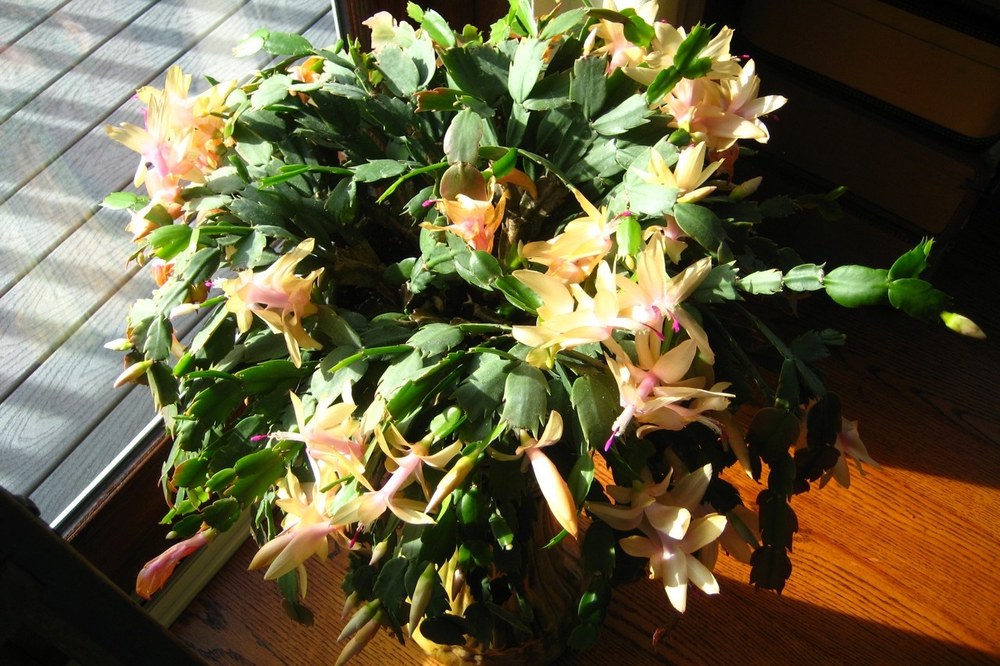Posted: December 21, 2021
Now that the cold weather is here, we gardeners must turn to indoor activities in order to get a "gardening fix".

The reward for digging in winter dirt – photo by Connie Holland
Garden catalogs are starting to fill our mailboxes with tantalizing photos and descriptions of new plants, bulbs, and seeds to try. That activity satisfies one only so long. I know that I need to get my hands in some "dirt" to be happy. My excavator neighbor used to tell me that the term "dirt" referred to what was on our kitchen floor, and what we were digging in was "ground." Either way, I need to get my hands in it.
Plants overwintered indoors provide an opportunity to get one's hands in that dirt. I overwinter my collection of tender cacti and succulents plus other tender plants. Over thirty cacti and succulents spend the winter in my basement workshop under artificial lights. These plants normally spend the rest of the year outside, so keeping them happy during the winter can be a challenge.
Through experimentation, I found that indoor succulents and cacti survive inside best under high-lumen fluorescent lights kept about 48 inches above the plants. I do not use any special grow lights. My plants sit on trays on a large table under four fixtures of double-tube 48" fluorescent fixtures on a timer. The fluorescent tubes have the highest stated lumen rating I can buy in order to provide the brightest light. Look for the lumen number on the bulb package. There are different lumen intensities for differing purposes so look for the highest number.
At this high light intensity, the succulents do not become leggy, and the cacti receive enough light to keep their shape. In fact, I find that some are happy enough to actually bloom during the winter. Right now there is White Fox Aloe in bloom. Some of my succulents, particularly the aloes, bloom with a single, tall stem bearing pendulant peachy-orange flowers at the tip. My Christmas and Thanksgiving cacti are especially beautiful. The bloom time of the Thanksgiving species is tied to how much daylight hours it receives. Some bloom late, others early.
At summer's end, I started softwood cuttings of Blue African basil and 'Black and Blue' salvia, both of which are tender perennials in our zone. The cuttings have become well established and are receiving enough light to show signs of wanting to bloom. What a treat!
Outside plants wintered indoors need attentive care during the winter. Unfortunately, aphids, soil gnats, and mealy bugs can pop up as indoor pests. Their eggs get carried inside in the potting soil and are triggered to hatch by the warmer indoor temperature. Aphids can appear like magic weeks after a plant is brought inside. Mealy bugs can become a persistent problem due to their habit of hiding in tight leaf folds. Hand removal and rubbing them with alcohol on Q-tips can keep them under control. Please do not spray pesticides indoors. If absolutely necessary, do so outside and always read the label and follow label instructions.
Some plants and tender perennials that prefer full sun can survive the winter if positioned near a southern or western facing window. Even potted herbs such as rosemary will survive if careful attention is paid to not overwatering, often a cause of plant fatality. I have two large pots that so far are doing well in a south sunroom window Overwatering is especially hazardous to succulents and cacti. In fact, I inadvertently overwatered a Life Saver cactus (Huernia reticulata) causing its center to rot.
Having some potted plants over-wintering inside gives us gardeners the best opportunity to stay in touch with what we love most - digging in the dirt. Another activity that can fulfill that need is grooming our houseplants. They certainly benefit from our attention to dead leaf removal, pruning to improve shape, repotting, and inspection for disease or pests. There are many varieties of houseplants that thrive in bright sunny windows to keep us happy gardening in the dead of winter especially when we long to get outside and dig in that dirt.
Connie Holland is a Penn State Master Gardener from Adams County. Penn State Cooperative Extension of Adams County is located at 670 Old Harrisburg Road, Suite 204, Gettysburg, phone 334-6271.
Monday videos: Visit us on Facebook at Penn State Master Gardeners in Adams County for our Master Gardeners' Monday Videos. Timely and relevant topics will be discussed on a weekly basis keeping readers up to date on current horticultural issues.
Home Gardening Essentials: Back to Basics. This course is for all gardeners and those wishing to start. The focus is on ornamental gardening. Saturdays in February, 10am - 11:30am.

